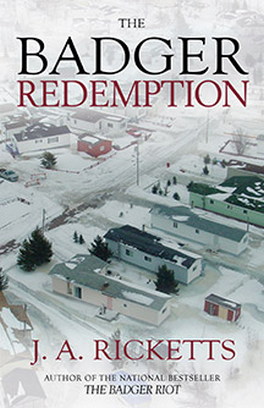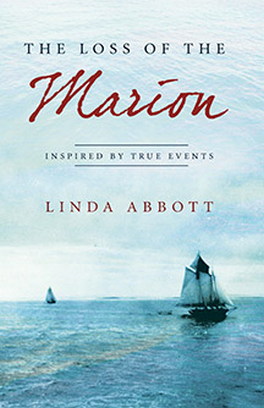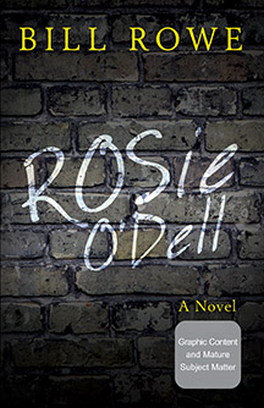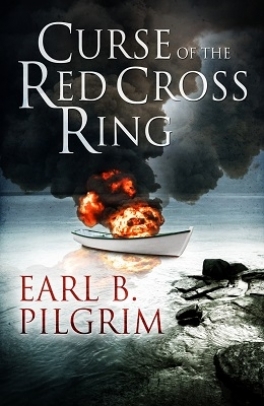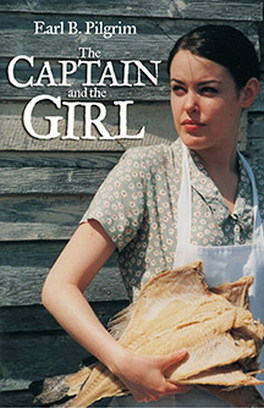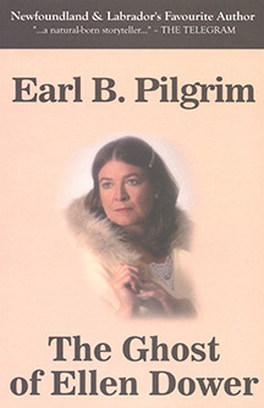Inspired by True Events Long after Demasduit’s skull has been stolen from her grave, and years after Shanawdithit has died, one Beothuk and his family survive. Bursting out of the pages of Newfoundland history appears Kop, the last true Beothuk. When all the other members of his tribe are exterminated by the Europeans, Kop seeks revenge against the Unwanted Ones. Hidden among the Bear Clan of the Mi’kmaq, the Beothuk strikes back. Follow Kop on his trail of defiance against the European marauders upon his Island. See what becomes of a man who has nothing to lose or live for. Stay with him on a hundred trails and sit with him across the smoke of a hundred campfires. You will not only weep for the last Beothuk—you will cheer him on as he pushes back against the Unwanted Ones.
Winner - 2018 #NL Reads - Love Our Local Author
There was a sudden blur beneath the dripping boughs. The plump kosweet’s left front leg had just reached the full extent of its reach, when a sleek, burnt, black-tipped spear punctured the delicate skin behind the shoulder blade of the unsuspecting animal.
For one heartbeat the deer halted, shocked into immobility. Then the spear sank farther into its soft fur. It went deep, between the ribs, and tore into a lung. The pain pushed the animal forward in flashes of grey along the narrow trail. There was a loud snap in the still air as the spear in the animal’s side broke against a tree as it ran. The rest of the panicked herd sped away from the trail, the dozen or more deer flashing over the barrens and disappearing into the trees beyond.
The figure who stepped into the game trail made no attempt to follow his prey. His leg muscles were tense and cramped from crouching. Long before the dawn he had hidden beneath the sloping, wet boughs of the spruce tree.
It had been carefully chosen, hard by the twisting trail of the kosweet and downwind from the flaring pink nostrils of the deer, which had led the small herd. The hunter had let the young stag, proud and strong, pass where he lay hidden. The rut was barely over and the buck’s meat would be tainted and foul-smelling with its sex glands. Instead he had chosen a female as his target and set out.
Cold autumn rain drizzled through the trees and settled onto the alder bush gorse and low shrubs. The raw wind that blew from the grey east carried the moisture deeper into the shrouded forest. Fog hung among the trees in gossamer webs.
The luxury of stretching relaxed the muscles of the tawny-skinned hunter. He turned into the wind and followed the winding trail the wounded deer had taken into the nearby forest. He wore deerskin clothing, which, with the soaking he’d gotten from his long wait, stank of old animal fat. The hide was plastered to his lean frame in dripping black, grey, and mottled white patches of heavy hair.
He had the easy gait of one born to walk, each effortless step the full length of his reach, a distance-eating stride, light and soundless. The slightly angular, hairless face was framed with a mane of hair the colour of a raven on a rainy night, the weight of it resting on his shoulders. The moisture beaded in his oily hair before dripping onto the warm, reddish-brown skin of his exposed neck. He was a Beothuk Indian, and he didn’t know if he was one of the last of his breed on the Island of Newfoundland.
His brown eyes were deep and intense but hinted at wisdom and compassion. Now they searched the trail ahead, missing nothing. His eyes narrowed to slits against the cold rain. He left the low bushes of the barrens and strode on into the forest of tall spruce trees, following the narrow trail of the caribou. Spots of froth appeared on the higher bushes. It was a sure sign of a lung wound. He made no hurry, knowing he was on the deer’s death trail.
Here the clinging bushes of the open barrens were left behind. The ground was covered with a yellow carpet of moss, with only the mar of the age-old caribou lead snaking among the tall trees, exposing the rocky soil beneath the floor. He found his spear shaft just past the first few trees. The break was red with blood. He caught the scent of the doe before he saw her, her smell strong and filled with death. A faint movement in a patch of ferns caught his eye. Moving closer, he approached cautiously, stepping around the back of the deer and not in front. He knew the smaller sharp antlers of the female were just as deadly as the larger of the stag. The cloven hooves were sharp.
The animal was lying on her right side, the wound from his broken spear barely visible, with only a trace of blood showing. The dying animal made a feeble, frightened attempt to rise at his approach, but the effort was too much and her efforts only caused a burst of frothy red bubbles to gush from her nostrils. Walking slowly around the back of the doe, the tall Beothuk watched the long pink tongue fall from the side of its open mouth. Suddenly, the long, graceful neck stretched out over the yellow counterpane, the short, muscled left leg stretching its length in unison with the death stretch of the head. The black cloven hoof kicked the air several times in rapid spasms before the muscles relaxed and drew the joint closer to the now still body. The black eyes of the animal remained open, staring, sightless.
Bending over the supine doe, the hunter picked up the head of his quarry by the antler and, satisfied the animal was dead, stood to his full height again. He pulled a stone knife from a sheath hanging by a leather thong around his narrow waist. Walking behind the fallen kosweet, he sighted along the direction of its staring eye, then stepped to a tree directly in the animal’s line of sight. He stripped off a piece of the bark with the knife. The black spruce wood exposed was damp and white. Stepping back to the animal, he grasped it by the antlers and pulled the head back until the soft throat was taut. Gripping the stone knife in his right hand, he cut through the warm skin with a brisk sawing motion. Instantly, dark, thick blood poured over his hands, and he quickly filled a cupped hand with the sticky liquid and walked back to the tree. Dipping his fingers into the blood, he made several straight marks up and down the smooth white surface of the spruce, facing the staring black eyes, making sure its dead spirit would keep following in the direction it wanted to go.
~
From far away, the sound of rolling thunder came to his ears. The Beothuk trembled in fear. Not from the sound of thunder, but from the memory of another thunder-like sound which had changed his life forever. It had happened far from here, on the shores of the sea. It was a secret he had kept hidden, and one he knew he would soon have to reveal. After a while the thunder faded away. The Beothuk was still shaken by the memory the booming noise had awakened in him. He continued cleaning the caribou.
It took him close to an hour to dress out the animal to his liking. The paunch was pulled away from the carcass and discarded, the heart, liver, and kidneys removed from the viscera. He cut out the tongue and placed the delicacy with the animal’s organs. His skilled hands cut through the neck vertebrae just behind the head, and making sure its still-open eyes looked in the direction of the marked blaze, he carefully placed the head on the ground. The deer fully eviscerated, he worked his knife between the animal’s joints and skilfully disjointed the legs at the knees.
Satisfied with his work, he cleaned his knife on a bunch of wet leaves. Placing the organs and tongue in his skin shoulder pack, he bent down to pick up the carcass.
On bended knees he first hoisted the heavier hindquarters and then the forequarters across his shoulders. Grunting with the weight, he shrugged the limp load of meat to a comfortable position. With one hand holding the deer’s legs tight to his chest, he turned back the way he had come.
“The Last Beothuk,” which includes some photos, a bibliography outlining his research, and a select glossary of Beothuk words, is a novel addition to the subject.
-- The Telegram --
Gary Collins has given life to the saga of Kop and his family. Their search for others of their dwindling tribe, and the losses Kop faces at the hands of encroaching white settlers, makes a gripping story.
Collins has obviously done his research, and I learned a great deal about Beothuk life, culture, and language as I read of Kop’s heartbreaking struggle.
The author’s knowledge of his native Newfoundland—the geography, flora, and fauna—provides a rich and detailed backdrop to this moving tale.
-- The Historical Novels Review --
The Last Beothuk has come to us, not only from the pages of history but from the brilliant mind of Mr. Collins, as he tells yet another forgotten story of Newfoundland. The record of relations between Europeans and any of Canada’s Indigenous peoples is definitely not a pleasant one, so the reader may be left somewhat disheartened after finishing The Last Beothuk. Nevertheless, we can take eminent satisfaction in the certainty that the now extinct Beothuk’s story has been well-told by one of Canada’s master storytellers.
-- Miramichi Reader --














